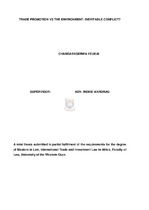| dc.contributor.advisor | Wandrag, Riekie | |
| dc.contributor.author | Yeukai, Chandaengerwa | |
| dc.contributor.other | | |
| dc.contributor.other | Faculty of Law | |
| dc.date.accessioned | 2013-06-20T11:53:19Z | |
| dc.date.available | 2007/03/28 09:02 | |
| dc.date.available | 2007/03/28 | |
| dc.date.available | 2013-06-20T11:53:19Z | |
| dc.date.issued | 2005 | |
| dc.identifier.uri | http://hdl.handle.net/11394/1516 | |
| dc.description | Magister Legum - LLM | en_US |
| dc.description.abstract | This study unveiled the trade-environment debate which has been revolving in the World Trade Organization for quite a long time now. While economic integration and trade liberalization offer the promise of growth and prosperity, environmentalists fear that free trade will lead to increased pollution and resource depletion. On the other hand, free traders worry that over-reaching environmental policies will obstruct efforts to open markets and integrate economies around the world. Trade liberalization has the potential to affect the environment both positively and negatively. Trade and environment tensions have therefore emerged as a major issue in the debate over globalisation. This paper examined the contours of these tensions and argued that trade policy and environmental programs can be better integrated and made more mutually supportive. | en_US |
| dc.language.iso | en | en_US |
| dc.publisher | University of the Western Cape | en_US |
| dc.subject | International Environmental law | en_US |
| dc.subject | Foreign trade regulation | en_US |
| dc.subject | Environmental aspects | en_US |
| dc.subject | International trade | en_US |
| dc.subject | Environmental policy | en_US |
| dc.subject | Economic aspects | en_US |
| dc.subject | Economic development | en_US |
| dc.title | Trade promotion vs the environment: Inevitable conflict | en_US |
| dc.type | Thesis | en_US |
| dc.rights.holder | University of the Western Cape | en_US |
| dc.description.country | South Africa | |

